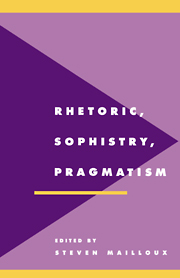Book contents
- Frontmatter
- Contents
- List of contributors
- Acknowledgements
- Introduction: sophistry and rhetorical pragmatism
- 1 Isocrates' philosophia and contemporary pragmatism
- 2 The degradation of rhetoric; or, dressing like a gentleman, speaking like a scholar
- 3 Antilogies, dialogics, and sophistic social psychology: Michael Billig's reinvention of Bakhtin from Protagorean rhetoric
- 4 The “genealogies” of pragmatism
- 5 Philosophy in the “new” rhetoric, rhetoric in the “new” philosophy
- 6 Individual feeling and universal validity
- 7 Pragmatism, rhetoric, and The American Scene
- 8 The political consequences of pragmatism; or, cultural pragmatics for a cybernetic revolution
- 9 In excess: radical extensions of neopragmatism
- Selected bibliographies
- Index
8 - The political consequences of pragmatism; or, cultural pragmatics for a cybernetic revolution
Published online by Cambridge University Press: 03 December 2009
- Frontmatter
- Contents
- List of contributors
- Acknowledgements
- Introduction: sophistry and rhetorical pragmatism
- 1 Isocrates' philosophia and contemporary pragmatism
- 2 The degradation of rhetoric; or, dressing like a gentleman, speaking like a scholar
- 3 Antilogies, dialogics, and sophistic social psychology: Michael Billig's reinvention of Bakhtin from Protagorean rhetoric
- 4 The “genealogies” of pragmatism
- 5 Philosophy in the “new” rhetoric, rhetoric in the “new” philosophy
- 6 Individual feeling and universal validity
- 7 Pragmatism, rhetoric, and The American Scene
- 8 The political consequences of pragmatism; or, cultural pragmatics for a cybernetic revolution
- 9 In excess: radical extensions of neopragmatism
- Selected bibliographies
- Index
Summary
“For the difference pragmatism makes is always the difference people make with it.”
Cornel West“I sometimes think I will drop teaching philosophy directly, and teach it via pedagogy.”
John Dewey, in a letter to his wife, Alice, 1894When John Dewey moved to Chicago in the summer of 1894, the great Pullman strike was in full swing. This was a critical moment in the early labor movement, because George Pullman had proclaimed that the model company town he had built in the 1880s represented a new kind of cooperation between management and workers. Yet in the spring of 1894 Pullman ordered a severe wage cut without any reduction in rent, services, or food in his model town. The local dispute escalated until it became a full-scale attempt by “powerful corporate managers to break the union and assert the superior power of capital.” Dewey was deeply interested in the progress of the strike, and his letters to his wife, Alice, who was then travelling in Europe with their children, reveal his sympathies for the workers, even though it was clear from the beginning that they would likely be defeated. Dewey's response to the strike also struck a chord regarding his own status as an academic and professional. (He had accepted the position at the University of Chicago by convincing the University President, William Rainey Harper, that Pedagogy should be a separate department. He was made Head of the Department of Pedagogy as well as the Department of Philosophy.)
- Type
- Chapter
- Information
- Rhetoric, Sophistry, Pragmatism , pp. 180 - 205Publisher: Cambridge University PressPrint publication year: 1995



